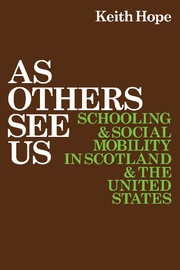Book contents
- Frontmatter
- Contents
- Acknowledgments
- Introduction
- 1 Scotland: A meritelective system?
- 2 Comparison of Scotland with England and Wales
- 3 Comparison of Scotland with the United States
- 4 IQ + effort = merit
- 5 The institutions of managed meritelection
- 6 Was selection carried out fairly?
- 7 Meanings of key terms
- 8 Does deprivation affect life chances?
- 9 Market situation
- 10 Intelligence and occupational mobility
- 11 Intelligence and vertical mobility
- 12 Scottish society
- 13 Understanding other people's norms
- 14 Merit or desert?
- Notes
- References
- Index
5 - The institutions of managed meritelection
Published online by Cambridge University Press: 05 February 2012
- Frontmatter
- Contents
- Acknowledgments
- Introduction
- 1 Scotland: A meritelective system?
- 2 Comparison of Scotland with England and Wales
- 3 Comparison of Scotland with the United States
- 4 IQ + effort = merit
- 5 The institutions of managed meritelection
- 6 Was selection carried out fairly?
- 7 Meanings of key terms
- 8 Does deprivation affect life chances?
- 9 Market situation
- 10 Intelligence and occupational mobility
- 11 Intelligence and vertical mobility
- 12 Scottish society
- 13 Understanding other people's norms
- 14 Merit or desert?
- Notes
- References
- Index
Summary
In this chapter we take the simple model at which we have arrived and analyze the relations among the three exogenous variables, considered as indicators of individual characteristics, and the three endogenous variables, considered as indicators of institutional processes. We find that the first principal component of the three individual variables correlates .76 with the first principal component of the three institutional variables. The corresponding canonical (maximized) correlation is .80. The analysis is somewhat technical, and readers who are not familiar with matrix methods will probably prefer to pass on to the following chapter.
We begin by distinguishing between institutions as, in a certain sense, inert transmitters of persons according to their individual characteristics, and institutions as autonomous processes with a life of their own that mold the fate of individuals. In the analysis, it will be assumed that personality, although it was actually recorded at age 14, is a determinant of school processes and is not determined by them.
Effects of the three exogenous variables
In order to investigate institutional autonomy, we must begin by examining institutional transmission. And we take occupation as the end point of the transmission process.
- Type
- Chapter
- Information
- As Others See UsSchooling and Social Mobility in Scotland and the United States, pp. 76 - 85Publisher: Cambridge University PressPrint publication year: 1985



